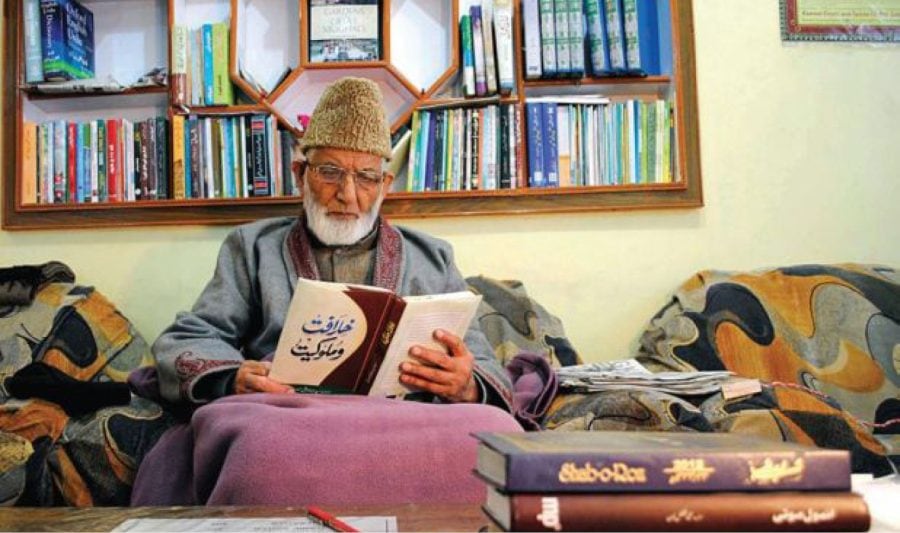In Indian illegally occupied Jammu and Kashmir, Dr Nayeem and Dr Naseem, sons of Syed Ali Gi-lani, have said that they were not allowed to conduct the last rites of their father as per Islam which was their right in every sense but it was also taken away from them.
They in a media interview in Srinagar said, “What brings peace to us is the fact that our father’s body was treated in the same way our father was treated when he was alive. It was all struggle and torture and oppression.”
Dr Nayeem and Dr Naseem said they could not participate in the funeral of their father. On Wednesday night when Syed Ali Gilani breathed his last, police and government officials came and took away the body, forcibly. The family could neither give Gilani his last bath, nor offer his funeral prayers, the duo said.
In the 92 years of his life, Syed Ali Gilani was imprisoned for 20 years, and spent the last decade under house detention. He was imprisoned in jails outside the territory as well.
During this period he suffered several ailments, including heart problems for which he had to undergo a pacemaker implant. One of his kidneys had to be removed and he was being treated for asthma of the lungs. But his teeth had been intact, very rare in a person his age.
His one remaining kidney, which was only half of the normal size, had begun to grow again, performing the function that two kidneys do. In between these health complications, Gilani, however, continued his political life, and wrote over 30 books on sub-jects ranging from religion to literature to politics.
Dr Naseem Gilani said that his father, despite many difficulties, never gave up his routine. He would wake up before Fajr prayers, take a walk, recite the Quran, and read books. After August 5, 2019, however, the day when New Delhi scrapped Kashmir’s special status, Gilani’s health began to deteriorate.
He started losing his appetite and also his memory. He would offer prayers sitting on the chair with gestures of his eyes, a method of prayers allowed for persons who are ill.
“It was under these health conditions that he left this temporary world,” Dr Naseem said. An hour before Gilani died, Dr Naseem had gone to see him. He sat beside him and his father held his hand very firmly, like never before. Dr Naseem kissed him after Gilani said his health was fine.
“I left to offer evening prayers. While I was do-ing it, I was called by the domestic help to see about something that was not right with Abu ji’s health. His oxygen level was dropping. We put him on oxygen, but the level was not coming to normal,” Dr Naseem said.
Since August 5, 2019, Gilani had been telling his family that he gets a sense of three persons regu-larly visiting him, asking him to be ready to leave this world. Dr Naseem would brush it aside, telling his father to tell the three persons that he still has a lot to do in this world.
But when the final moments arrived, Gilani gave no inkling of it to his son. In fact, his health seemed to be all right until the sudden fall in the oxygen level.
It was around this time that medical assistant Omar, who had been attending to Gilani’s health since long, was called.
He sounded an alert and soon after, the Director of Soura hospital ar-rived. He declared that Gilani had passed away. Meanwhile, police and paramilitary forces sur-rounded the house. Two senior officers started a conversation about how the last rites would be con-ducted.
“We told them (police) that it will be done to-morrow morning, so that all the relatives arrive and have a last glimpse of Gilani sahab. Women present at the home also told them to not touch the body with their hands.
But then they (police) came at 3am after we refused to do the last rites during the night. They forcibly took the body and did the last rites without family members,” Dr Naseem added.
“They wanted us to be part of their game. They wanted us to offer funeral prayers with them, so that they can click photos and show them to the world. We did not allow that to happen,” he said.
The administration had imposed curfew-like re-strictions as soon as the news of Gilani’s death came out. At the same time, all mobile and internet ser-vices were snapped, and journalists barred from visiting the scene to cover the funeral.
Till the morning the family did not know what the govern-ment had done with Gilani’s body, Dr Naseem said.
In the morning, as the brothers left home in search of their father’s grave, they found him buried in the local graveyard. Locals identified the grave for them.
“We offered prayers to him and left. But there was no one from the administration who reached out to us after that. They just wanted us to take away the right of funeral from us, and they did,” Dr Naseem said.—KMS










